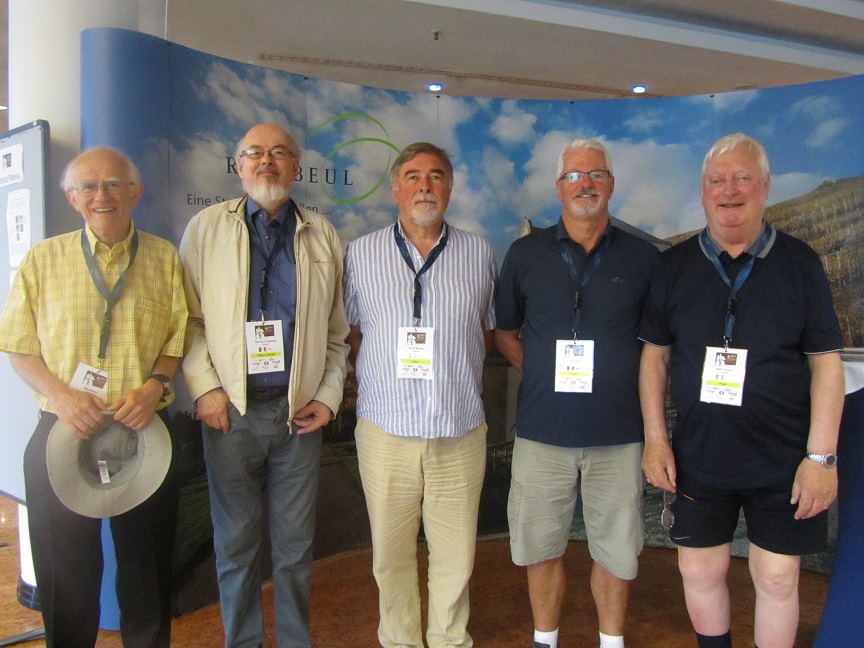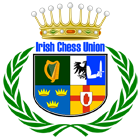Tim has had a follow up piece on the event published here.
The FIDE World Senior Team Championships for 2016 were held from 26 June to 4 July at Radebeul, a pleasant suburb just outside the city of Dresden, where the rebuilding after the devastation of 1945 is now almost complete. This was the first time that Ireland sent a team to one of these, now increasingly popular, competitions, and the ICU kindly supported the five team members by paying our entry fees, amounting to €350. I believe the money was well spent as it is important to “show the flag” at least occasionally at such events, and at this time, just after the Brexit referendum, we were able to reassure those we met that Ireland is still very much pro-European.
Our team in board order were: myself, Ray Byrne (Gonzaga), Patrick Daly and Jim Murray (Lucan) and Matt O’Leary, a former Irish Championship runner-up who lives in Sweden. Several other eligible players had been consulted over the previous months but eventually, because of family, health and work issues, we were the five who were willing and able to travel at this particular time.
The tournament venue was ideal and the organisers (both chess and hotel) coped well with the 107 teams that arrived from 23 countries to compete in the two tournaments. The 50+ championship was for anyone born on or before 31 December 1966 while the eligibility date for the “real seniors” 65+ championship, in which we competed, was the end of 1951.
One way in which these events differ from the Chess Olympiads is that countries can enter several teams if they wish, with regional and club sides (mostly from Germany and Austria) being in the majority. For players such as myself who played in an Olympiad long ago or who once played correspondence chess internationally, these Senior events are also an opportunity to renew acquaintance with old friends and former opponents, and the social atmosphere was very friendly once the hard-fought morning games were over.
The 50+ tournament was much more hotly contested than last year, with Germany-1 running out winners ahead of Armenia and England-1. Among the famous names competing were several former top-20 grandmasters, such as Artur Yusupov (playing for the Emmanuel Lasker Gesellschaft), Johann Hjartarson (who recently won the Icelandic Championship again), Rafael Vaganian and England’s top boards John Nunn and Jon Speelman. It was also interesting to see former FIDE President Fridrik Olafsson (born in 1935) who was reserve for Iceland and played in four of their matches. Russia traditionally only send a Women’s team to the 50+ tournament (where they competed near the top and won the women’s team prize) but in our tournament there were no female-only teams.
The Russians always win this, led on this occasion by GM Sveshnikov, while a team from St Petersburg took silver, so the rest of the teams were really fighting for bronze. This was a bit more open than it might have been because Israel, who entered teams for both tournaments, failed to put in an appearance.
Teams are of four with an optional reserve and players must keep to the declared order, though there is no requirement to follow ratings for that. As in Olympiads, a 2-2 result scores one match point while anything above 2 is worth two match points. Some teams seemed to be quite canny about this, agreeing two or three draws in the early stages and leaving their most in-form players to fight for the points to the end.
In such an event, where the taking part is more important than the winning for most of the competitors, it is of course still important to try one’s best and our main target was to win some matches and finish ahead of our initial seeding: 41 st out of 50 teams in the 65+. With three matches won, two drawn and four lost, we ended in a tie for 30th to 37th places and three of the team managed to gain a few rating points in the process.
With a bit more experience of such events, and some luck, we could perhaps have finished on 50 per cent or just above. We had the inevitable tough match to begin (top half against bottom half draw), but were unlucky that this brought us up against Belgium who won the bronze medals in the end.
After five hours I had to succumb to the 2015 European Senior Individual Champion, Jan Rooze, who finished with the best result in the whole tournament. He drew with the two Russian top boards, had a win by default in one round and won the rest of his games.
This defeat brought us an easy match in round two but my opponent had an accident overnight and defaulted, while I shall a draw a veil over the mishap that prevented us achieving a 4-0 whitewash. The main thing was that we won the match and we fought ourselves to 3MP after the third round thanks to an excellent result of four draws against the seventh seeds.
Our fourth round opponents looked less formidable on paper but were led by an IM who was a regular on East German Olympiad teams for decades. Fortunately I noticed in my preparation that he did not seem averse to time off from the chessboard and a timely draw offer accompanying a queen exchange at move 10 brought the desired outcome. To optimise our results, more of this sort of thing might have paid off but on the whole we all fought games out unless the other side offered to split points. The rest of their team had too much experience for our lads.
Also in round five, where I took my rest day as my wife had just arrived, the team lost again. In both these matches and some others, some good positions were spoilt in the last half hour of play. In round six, however, a win by Jim and three draws brought in the two match points.
Next day, in round 7, we had our best result, winning 3-1 against another team from the region, Freibauer Niedersachsen, with wins from Matt and myself, a rather strange draw from Ray and a totally mad game by Patrick who came back from three pawns down to draw somehow. This in part made up for some of the good positions he had earlier failed to capitalise upon.
Unfortunately we met our match in round 8 against Hessen 1 where everything went wrong in the fourth hour just when a drawn match seemed likely. Matt had a “senior moment” turning 1 into 0, whereupon I lost focus in my game (where I had been battling for a draw throughout), hallucinated that I had winning chances and eventually, short of time, lost an ending which was still drawable, with knight and four pawns against rook and bishop.
Matt had to leave early on the final day where we met Hessen 2, who on paper were nearly as strong as the previous opponents but proved somewhat more vulnerable. My opponent got into a terrible mess very early on, which I think discouraged their other players, and we soon led 2-1, but unfortunately Jim had to strike his colours after over five hours and seventy moves.
I don’t want to say much about individual performances. We expected before going to be struggling on the top two boards but to have winning opportunities on boards 3 and 4 in many matches. That was based on looking at the ratings from the 2015 competition; this year’s entry seems to have been stronger, bar two or three teams. We were actually out-rated on every board in five matches.
Matt was our star player and but for the blunder in round 8 he would have had a really excellent result. Ray played more solidly as the tournament went on; he was the only one of us to obtain winning chances against the Belgians but it was a very complicated position. He clearly has a reliable opening repertoire and I think would make a good captain for next time. Jim strove manfully to overcome the burden of so many games with Black and scored the decisive point in round six.
Patrick, though unfortunately out of form, never despaired and the results chart shows he brought in some important half points in matches where we scored. I was fairly pleased to see that I was one of only nine top board players to score 50% or better among the 25 teams that finished in the bottom half.
A mistake I made on the captaincy side ended up in Jim playing mostly with Black and Patrick with White. This happened partly because of the days we had each chosen to take off, not realising early enough that the pairing system would prioritise alternating White on odd and even boards for all teams up to round eight. This actually had the absurd consequence in the 50+ tournament that the only two teams who had won their first five matches were not paired together in round six.
Some teams did not bring a reserve. It would actually be easier to manage a team of four because everyone would know where they stood from the start and be sure of at least four games with White. The downside is that some teams defaulted games while poor Tunisia had to play every match starting at 0-1 because their top board never arrived.
Our biggest disappointment, perhaps, was that we did not meet more varied opposition. There were, after all, in our zone of the tournament, two of the three English teams, and various Scandinavian, Dutch and Austrian squads, but somehow we always got paired against Germans. Next year, when the event is due to be played at Eritrea (a resort near Athens), there will probably be a smaller entry and fewer Teutonic teams, but when it returns to Dresden in 2018 I think many of us will nevertheless want to go again, if we still have our health and wits about us.
So for next year’s World Senior Teams, I hope that it will be possible to send an Irish senior team to Greece, at least to one of the tournaments. I shall be happy to help with co-ordination and offer advice in advance but probably will not be able to play.
Next year’s Reykjavik Open, which I have long planned to enter, has just been announced from 19-27 April instead of the usual March dates. As the World Teams is scheduled from 28 April to 7 May 2017, competing in both is out of the question. It is likely therefore that there will be two or three “vacancies” on our squad. It would also be possible to send a 50+ team, including one or more players eligible for the 65+, but that would need a couple of 2100+ players to avoid suffering too much.

